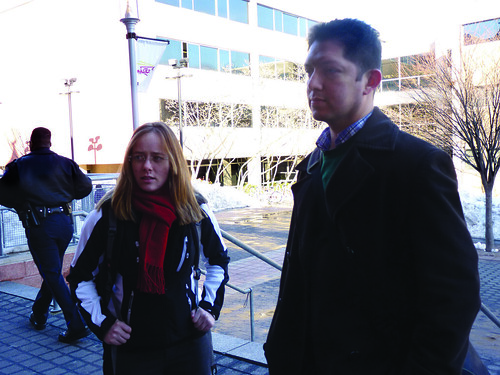After TU Purpose contacted the Foundation for Individual Rights in Education, a security fee assessed to the student group for a fall event was canceled.

It has been five months since Dutch politician Geert Wilders made his controversial appearance at Temple, but the controversy surrounding the event has yet to die down.
Wilders, who spoke at Anderson Hall in October, is known for his strong opinions on Islam. Temple University Purpose sponsored the event, asking for help from the College Republicans. Initially, the political student group offered its sponsorship of the event but dropped support after protests from the Muslim Student Association, among various other student groups.
Due to the controversial nature of the event and protestors who gathered outside the building, security presence was heavy.
On Dec. 3, after paying what TU Purpose believed to be a $576 security fee, they received an invoice from Temple requesting $800 for a “security officer.” TU Purpose interim President Brittany Walsh contacted Alicia Ferguson, the reservation coordinator for Student Center operations, who sent the invoice, to ask why the amount the organization owed changed.
“They said if there were any changes, for whatever reason, they would notify us to change the contract,” said Walsh, a senior social work major.
On Dec. 11, Ferguson wrote Walsh an e-mail saying that she would “speak with Jason [Levy, director of the Student Center], regarding the university eating the cost.”
On Dec. 22, Walsh sent an e-mail to Ferguson requesting the outcome of the conversation but never received a reply.
Walsh then contacted the Foundation for Individual Rights in Education, which contacted Temple President Ann Weaver Hart.
FIRE claimed the additional, after-the-fact security fees requested of the student organization were unconstitutional based on the 1992 Supreme Court ruling in the case of Forsyth County v. Nationalist Movement, which states that “speech cannot be financially burdened, any more than it can be punished or banned, simply because it might offend a hostile mob.”
“Individuals wishing to silence speech with which they disagree merely have to threaten to protest and student groups not able to furnish adequate funds for security will be forced to cancel their events,” Adam Kissel, director of the Individual Rights Defense Program of FIRE, wrote in his letter to Hart.
Associate University Counsel Valerie Harrison responded in an e-mail.
“A charge of $224 was assessed for the additional security requested by TUP,” Harrison’s e-mail read. “Even though the cost of the requested added security amounted to more than $6,000. … The $6,000 could have legally been imposed on TUP because it was not based upon program content, but upon the request of the student organization.”
“While student groups may request any level of security for an event, Temple is under no obligation to provide the requested level of security,” Director of Legal and Public Advocacy for FIRE Will Creeley said in response. “Unless Temple itself deems that level of security to be necessary.”
Though administration members said they do not feel the university acted unconstitutionally, the fee to TU Purpose was withdrawn.
“Temple University shares Temple University Purpose’s concern for protecting freedom of expression,” Assistant Director of University Communications Hillel Hoffmann said. “The fact that Temple agreed to absorb more than $6,000 for added security at the Geert Wilders event in October 2009 reflects Temple’s commitment to fostering an environment where students, employees and visitors are free to express themselves.
“Temple University Purpose was not charged extra for security because of the controversial nature of the event. The additional $224 fee that TUP owed was related to the numerous last-minute requests that changed the event’s security needs,” he said.
In all circumstances where student organizations host an event, they are asked to sign a contract with the university. A 20 percent discount is offered to help cover the costs of the event. The programming guide states, “Increased risks (e.g., threats received) will increase the security requirement.”
FIRE deems this policy unconstitutional, and Harrison said she “would be happy to discuss the university’s guidelines with [FIRE].”
“It really isn’t the entire university that has these problems,” Walsh said. “There are a lot of people in the university who want to hear stories like this so they can correct this type of thing.”
TU Purpose President Alvaro Watson, a senior social work major, and Walsh expressed an overall disappointment with the situation surrounding the October event.
“All we wanted was for no one to get in trouble for anything other than trying to have an open forum,” Walsh said.
Abe Rosenthal can be reached at abraham.rosenthal@temple.edu.



Be the first to comment